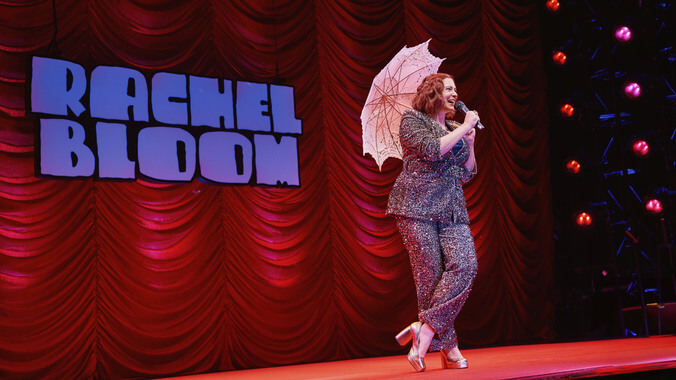Are You There God? Rachel Bloom Just Wants To Talk in Death, Let Me Do My Show
Photo by Emilio Madrid
For the privileged among us, death seems easy to ignore. In a culture of suffocating optimism and compulsive silver-lining, an awareness of the ever-looming presence of our mortality drives us away from the sunny-skies coping mechanisms we so often employ to get us through our days. But ignoring death will never make it go away.
In March of 2020, Rachel Bloom gave birth to her daughter at the same time her writing partner (and Fountains of Wayne member) Adam Schlesinger passed away from covid. While her daughter was on one coast strapped to a ventilator in the NICU, Schlesinger was fighting a losing battle against the novel coronavirus; not lost on Bloom, the cosmic irony left the Emmy-award-winning musical comic grappling with the uncertainty of life.
Over the course of a few short months, Bloom endured a number of excruciating brushes with death, including the passing of multiple others in her close circle of collaborators and support network. In addition to the anguish and fears inherent in new motherhood, Bloom was left with no other choice than to confront the grim reality of the human condition, as she so eloquently and affectingly does in her new one-woman performance, Death, Let Me Do My Show.
Prior to the pandemic, Bloom sought to put on a show that made people laugh, a production filled with silly songs and her classic punchy, up-beat cerebral stand-up routine, but the events in her personal life during the beginning stages of the pandemic forced Bloom to face her ambiguous feelings about the afterlife. Prior to 2020, she rarely thought about death, she shares in her show, but amidst the tragedy of the pandemic and its personal implications on her life, as well as the complications surrounding her daughter’s birth, grief came knocking, an all-consuming sound Bloom couldn’t ignore. I spoke with the decorated multi-hyphenate to discuss the return of her off-Broadway act, the role humor plays in accepting our impending fates, and how to acknowledge death while still continuing to live.
The trick is not to let it consume you, Bloom shares over the phone with me, and she’s found during her writing process that laughter can act as an effective anecdote to existential dread.
“Humor almost makes you forget death for a second,” she says to me on our call.
Perhaps it’s the surprise of it all. Much like death, the formula for a joke that works relies on its ability to catch the audience off-guard. “Humor and surprise are interconnected,” says Bloom, in that you “don’t see the joke coming.”
As a novice to the crippling magnitude of grief, Bloom definitely didn’t see her world turning on its head as it did during the pandemic.
Although her new show (playing for its second run in New York City at the Orpheum Theatre from December 7th through January 6th) certainly has humor in spades, it won’t let audiences ignore death, nor will it provide any exact answer to the existence of an afterlife. If Bloom has to sit with the excruciating discomfort of not knowing, we do too.
When I asked Bloom how she addresses these difficult themes with her young child, like any good parent, she admits to protecting her daughter from what she “doesn’t need to know.”
Voicing a similar sentiment about her return to the waking world following her intimate encounters with the dark side, she shares with me that, “how much you take in” about the unfortunate facts of life impacts your ability to move forward.
-

-

-

-

-

-

-

-

-

-

-

-

-

-

-

-

-

-

-

-

-

-

-

-

-

-

-

-

-

-

-

-

-

-

-

-

-

-

-

-








































